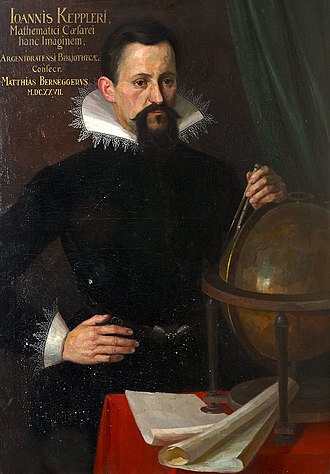On this date, December 27, 1571, Johannes Kepler was born.
He's turning the big 4-5-2.
Yeah, I know; there was a calendar change between then and now, so it's really ... eleven days later, or maybe earlier. I don't know.
Johannes Kepler

Portrait of Kepler by an unknown artist in 1620.
Born: 27 December 1571; Free Imperial City of Weil der Stadt, Holy Roman Empire
Died: 15 November 1630 (aged 58); Free Imperial City of Regensburg, Holy Roman Empire
Nationality: German
Education: Tübinger Stift, University of Tübingen (M.A., 1591)
Known for: Kepler's laws of planetary motion, Kepler conjecture, Rudolphine Tables
Johannes Kepler (/ˈkɛplər/; German: [joˈhanəs ˈkɛplɐ, -nɛs -] (About this soundlisten); 27 December 1571 – 15 November 1630) was a German astronomer, mathematician, astrologer, natural philosopher and writer on music. He is a key figure in the 17th-century Scientific Revolution, best known for his laws of planetary motion, and his books
Astronomia nova,
Harmonice Mundi, and
Epitome Astronomiae Copernicanae. These works also provided one of the foundations for Newton's theory of universal gravitation.
Kepler was a mathematics teacher at a seminary school in Graz, where he became an associate of Prince Hans Ulrich von Eggenberg. Later he became an assistant to the astronomer Tycho Brahe in Prague, and eventually the imperial mathematician to Emperor Rudolf II and his two successors Matthias and Ferdinand II. He also taught mathematics in Linz, and was an adviser to General Wallenstein. Additionally, he did fundamental work in the field of optics, invented an improved version of the refracting (or Keplerian) telescope, and was mentioned in the telescopic discoveries of his contemporary Galileo Galilei. He was a corresponding member of the Accademia dei Lincei in Rome.
Kepler lived in an era when there was no clear distinction between astronomy and astrology, but there was a strong division between astronomy (a branch of mathematics within the liberal arts) and physics (a branch of natural philosophy). Kepler also incorporated religious arguments and reasoning into his work, motivated by the religious conviction and belief that God had created the world according to an intelligible plan that is accessible through the natural light of reason. Kepler described his new astronomy as "celestial physics", as "an excursion into Aristotle's
Metaphysics", and as "a supplement to Aristotle's
On the Heavens", transforming the ancient tradition of physical cosmology by treating astronomy as part of a universal mathematical physics.
{snip}
Tue Dec 27, 2022:
On this date, December 27, 1571, Johannes Kepler was born.
Mon Dec 27, 2021:
On this date, December 27, 1571, Johannes Kepler was born.
WBBM has been running segments about this all morning. They came from the Adler Planetarium.
